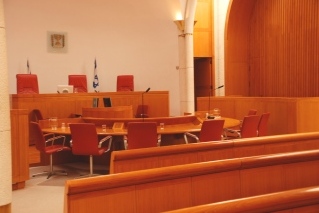 Photo by Melanie Takefman
Photo by Melanie Takefman
An expanded panel of 9 Justices at the High Court of Justice will discuss the petition to invalidate the amendment to the law commonly referred to as the Anti-Infiltration Law.
On Sunday June 2, 2013, the High Court of Justice, sitting with an expanded panel of 9 Justices, will discuss the constitutionality of the amendment to the Law to Prevent Infiltration. The law allows, among other things, the detention of children and asylum seekers for a minimum period of three years, even if the state has no intention of sending them back to their home countries due to the dangers they would face to their lives upon their return.
The amendment to the Law to Prevent Infiltration, which went into effect over a year ago, permits the detention of asylum-seekers that have entered Israel through the Sinai Peninsula for a period of at least three years without a trial. Approximately 2,000 people who entered the country over the last year are currently being detained under the law, including dozens of children. The vast majority of the detainees are Eritrean and Sudanese citizens – countries whose citizens, according to the government’s own directives, cannot be deported due to the threat to their lives.
The petition claims that both Israeli and international law prohibits the detention of immigrants if it is not for the purpose of deporting them. It further adds that the detention of asylum-seekers fleeing for their lives, who suffered through torture camps in Sinai, is likely to substantially aggravate the harm done to their health and welfare. Moreover, it makes clear that deterring new immigrants from traveling to Israel cannot be a sufficient justification for the detention of past immigrants.
Following an initial hearing on March 12, Supreme Court President Asher Grunis announced that the panel of three justices, which he headed, will issue an order nisi – an order that the government must explain why the amendment to the Law to Prevent Infiltration should remain in effect.
In a 97-page response submitted by the state on May 13, it was claimed that the law creates a “dynamic” mechanism for releasing detainees in a variety of different ways and that incarceration is required in order to maintain state sovereignty and to reduce the incentive for “infiltrators”. The state additionally claimed that most of the detainees are ‘migrant workers’ and not genuine refugees, despite not having concluded examining a single refuge application in the year since the amended law went into force.
In a response to the state’s claims submitted on May 26, it was made clear that the state’s narrative is a distortion of reality:
- The “dynamic” release framework that the state mentioned in its response has so far brought about the release of less than 7% of the 2,000 detainees being held under the law, while all of the others are expected to be held in custody for at least three years.
- Today, law or no law, the number of entrants to the country is minimal due to the construction of the fence on the border with Egypt.
- The ‘custodial facility’ that the state referred to in its response is no more than a glorified jail with particularly harsh conditions and an administrative punishment system.
- Most importantly, the law enables the unlimited administrative detention of anyone who does not meet deportation standards due to the threat faced to their lives, no matter whether the state decides they are refugees or not.
The hearing this Sunday will be heard at 10:00am before Supreme Court President Asher Grunis, Deputy President Miriam Naor and Justices Arbel, Joubran, Hayut, Danziger, Hendel, Vogelman and Amit.
The latest response was written and submitted by:
• Attorney Yonatan Berman of the Clinic for Migrants’ Rights at the Academic Center of Law and Business in Ramat Gan,
• Attorney Anat Ben Dor of the Refugee Rights Clinic at the Tel Aviv University Faculty of Law,
• Attorney Oded Feller of the Association for Civil Rights in Israel (ACRI), and
• Attorney Asaf Weitzen of the Hotline for Migrant Workers.
Related Materials







